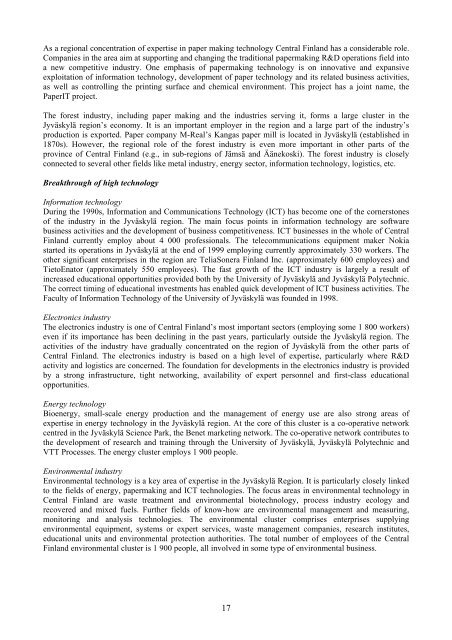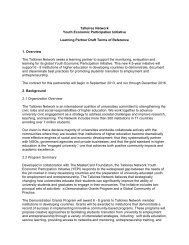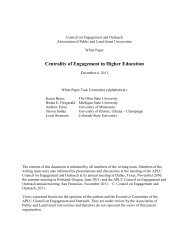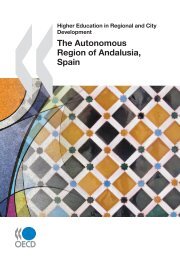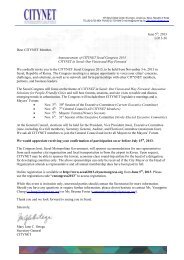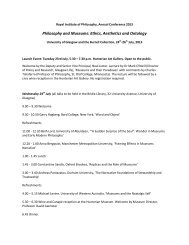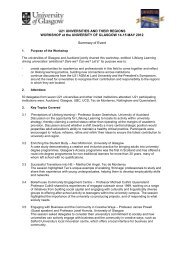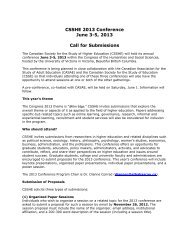Finland - Jyvaskyla Region - Final Self-Evaluation Report.pdf
Finland - Jyvaskyla Region - Final Self-Evaluation Report.pdf
Finland - Jyvaskyla Region - Final Self-Evaluation Report.pdf
You also want an ePaper? Increase the reach of your titles
YUMPU automatically turns print PDFs into web optimized ePapers that Google loves.
As a regional concentration of expertise in paper making technology Central <strong>Finland</strong> has a considerable role.Companies in the area aim at supporting and changing the traditional papermaking R&D operations field intoa new competitive industry. One emphasis of papermaking technology is on innovative and expansiveexploitation of information technology, development of paper technology and its related business activities,as well as controlling the printing surface and chemical environment. This project has a joint name, thePaperIT project.The forest industry, including paper making and the industries serving it, forms a large cluster in theJyväskylä region’s economy. It is an important employer in the region and a large part of the industry’sproduction is exported. Paper company M-Real’s Kangas paper mill is located in Jyväskylä (established in1870s). However, the regional role of the forest industry is even more important in other parts of theprovince of Central <strong>Finland</strong> (e.g., in sub-regions of Jämsä and Äänekoski). The forest industry is closelyconnected to several other fields like metal industry, energy sector, information technology, logistics, etc.Breakthrough of high technologyInformation technologyDuring the 1990s, Information and Communications Technology (ICT) has become one of the cornerstonesof the industry in the Jyväskylä region. The main focus points in information technology are softwarebusiness activities and the development of business competitiveness. ICT businesses in the whole of Central<strong>Finland</strong> currently employ about 4 000 professionals. The telecommunications equipment maker Nokiastarted its operations in Jyväskylä at the end of 1999 employing currently approximately 330 workers. Theother significant enterprises in the region are TeliaSonera <strong>Finland</strong> Inc. (approximately 600 employees) andTietoEnator (approximately 550 employees). The fast growth of the ICT industry is largely a result ofincreased educational opportunities provided both by the University of Jyväskylä and Jyväskylä Polytechnic.The correct timing of educational investments has enabled quick development of ICT business activities. TheFaculty of Information Technology of the University of Jyväskylä was founded in 1998.Electronics industryThe electronics industry is one of Central <strong>Finland</strong>’s most important sectors (employing some 1 800 workers)even if its importance has been declining in the past years, particularly outside the Jyväskylä region. Theactivities of the industry have gradually concentrated on the region of Jyväskylä from the other parts ofCentral <strong>Finland</strong>. The electronics industry is based on a high level of expertise, particularly where R&Dactivity and logistics are concerned. The foundation for developments in the electronics industry is providedby a strong infrastructure, tight networking, availability of expert personnel and first-class educationalopportunities.Energy technologyBioenergy, small-scale energy production and the management of energy use are also strong areas ofexpertise in energy technology in the Jyväskylä region. At the core of this cluster is a co-operative networkcentred in the Jyväskylä Science Park, the Benet marketing network. The co-operative network contributes tothe development of research and training through the University of Jyväskylä, Jyväskylä Polytechnic andVTT Processes. The energy cluster employs 1 900 people.Environmental industryEnvironmental technology is a key area of expertise in the Jyväskylä <strong>Region</strong>. It is particularly closely linkedto the fields of energy, papermaking and ICT technologies. The focus areas in environmental technology inCentral <strong>Finland</strong> are waste treatment and environmental biotechnology, process industry ecology andrecovered and mixed fuels. Further fields of know-how are environmental management and measuring,monitoring and analysis technologies. The environmental cluster comprises enterprises supplyingenvironmental equipment, systems or expert services, waste management companies, research institutes,educational units and environmental protection authorities. The total number of employees of the Central<strong>Finland</strong> environmental cluster is 1 900 people, all involved in some type of environmental business.17


